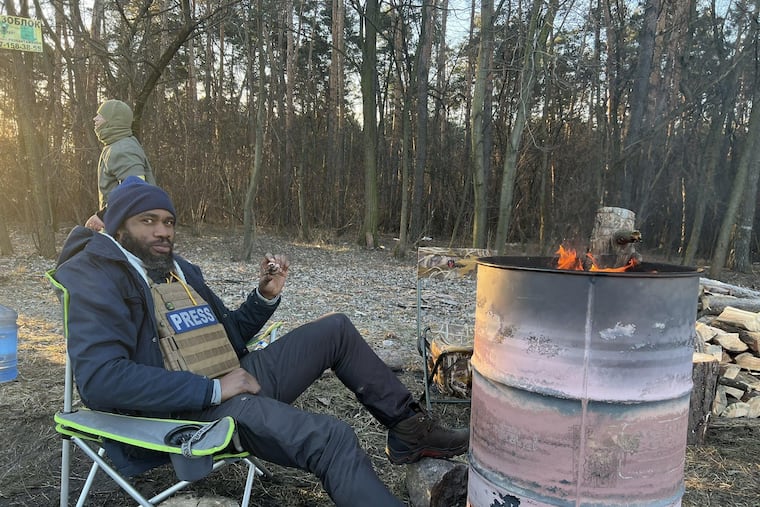Terrell Jermaine Starr could have left before war broke out in Ukraine. Instead, he stayed to help. | Jenice Armstrong
The journalist and Fulbright scholar saw his notoriety grow while covering the invasion. His attachment to the story was professional and personal: "I love and care for a lot of people over there."

Terrell Jermaine Starr loves him some Ukraine.
I was researching troubling reports about African students struggling to leave Ukraine who faced discriminatory treatment when I came across his Twitter account and became intrigued.
There was Starr — Detroit native, Fulbright scholar, and a graduate of Philander Smith College, a tiny historically Black school in Arkansas — dodging Russian missiles and providing on-the-ground breaking news reports on cable-TV stations while also trying to help Ukrainians escape to Poland.
Starr, who’s 41, wears a lot of hats — in addition to being a senior nonresident fellow at the Eurasia Center of the Atlantic Council, he’s a journalist and the host of the Black Diplomats podcast, which he founded. On top of all that, he’s a self-described cultural ambassador for Ukraine, which has become his second home.
His passion for Eastern Europe began during a three-month trip to Georgia in 2001 and has magnified the pain of covering the invasion for the past two months.
“It is heartbreaking because everything in my friends’ lives is in this holding pattern until this one person in the world decides that he is satisfied,” Starr said of Russian President Vladimir Putin. “The stories that I hear are awful. Families are being broken apart.”
MSNBC host Joy-Ann Reid retweeted a Politico piece about him, saying, “As long as I’ve known [Starr] he’s been passionate about Ukraine (which is like his second home.) His coverage has been full of empathy and the unique understanding you acquire as a journalist who walks in this world as a Black person.”
Starr is more blunt in his self-assessment. In the caption of one social media photo, Starr described himself as a “brotha embedded with some Ukrainian patriots ...”
Last week, Starr arrived back in the United States to “recalibrate.” I lined up along with CNN, MSNBC, and other news outlets for a chance to interview him, too.
“I knew that there was a possibility but did not really think that it would be a full-scale war,” said Starr, once I got him on the phone.
» READ MORE: Don’t let reports of racist acts by Ukrainians against Africans distract from what’s at stake | Jenice Armstrong
“I did not plan on leaving when the Russians invaded because those are my friends over there,” Starr said. “I just didn’t feel like leaving them when I felt like I could be helpful in some way, even if that means telling the stories in my unique fashion.”
Starr, who has written for The Root.com, among other publications, arrived in Ukraine on Jan. 6 to explore starting a tourism and clothing resale business. He planned to stay three weeks but wound up sticking around for three months.
A Feb. 27 tweet showed him dressed in a helmet and bulletproof vest with the word “press” across the front, along with the words, “My new daily outfit. I’ll be out in the field following citizens who volunteered to take up arms. Stay tuned!”
As someone who watched the horrors in Ukraine unfold from the relative safety of this country, I couldn’t wrap my head around the fact that Starr chose to stay even as Russian soldiers advanced on Kyiv, the nation’s capital city, where he spent most of his time.
“I just honestly didn’t want to leave, and I love and care for a lot of people over there,” he told me. “I’m happy that I stayed because there were a lot of people who really needed me.”
Traditional, mainstream reporters come and go from war zones all the time. But Starr is part of a new breed of fiercely independent journalists who aren’t tethered to mainstream news operations nor to traditional rules about objectivity. Instead, he considers himself as much of an advocate as a storyteller. And, as evidenced by Reid’s tweet, his work resonates deeply with his followers, who finance his work via payments made through his CashApp, Venmo, and PayPal accounts.
Besides holding an undergraduate degree in English, Starr also has a master’s in journalism as well as a second master’s in Russian, East European, and Eurasian studies. His earliest travel abroad experiences were funded by the United Methodist Church. Starr made his first visit to Ukraine as a Fulbright scholar in 2009 and has been back so many times since that he’s lost count. He plans to return in July and remain until year’s end.
Meanwhile, Putin vowed Tuesday that his country’s bloody offensive will continue, despite withdrawing forces in the face of stiff Ukrainian opposition and considerable losses.
“This is embarrassing for Putin,” Starr said. “When you see images of people going up to Russian soldiers facing death and saying, ‘Get out of my country.’ You can’t oppress those kinds of people because they are not afraid to die.”
“All of my friends when I speak with them, they are just hardened and they’re angry,” he continued. “Ukrainians say, ‘Putin has enough slaves in Russia. We’re not going to join them.’ There’s an extreme hatred in Ukraine for anything Russian. So, any type of political reconciliation. That’s gone.”
Starr believes they will never give up fighting for Ukraine’s sovereignty — and neither, in his own way, will he.